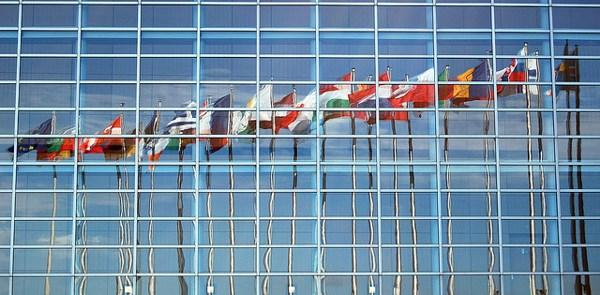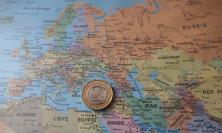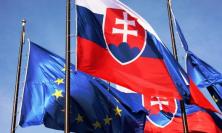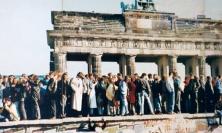One of the issues that voters will be considering ahead of the General Election on 7 May is membership of the European Union. On the Feast of St Catherine of Siena, Co-patron of Europe, Anthony Carroll considers how well the current structures of the EU are fulfilling the initial aims of the union, which have a strong grounding in Catholic Social Teaching. If Europe cannot recover a rich and transcendental vision of human beings, it ‘runs the risk of reducing questions of the good to technical questions of instrumental management.’
In an open and democratic society such as the United Kingdom, Catholic Social Teaching should not be seen as providing a mandate for one or another legitimately constituted political party; people who follow the Church’s social doctrine are to be found in all parties. That being said, however, the social teaching of the Church does have something to offer voters: a set of core principles which have emerged out of a long tradition of reflection on the nature of human persons and their social destiny. In providing such principles for reflection, which also issue criteria for judgment and directives for action, Catholic Social Teaching seeks to promote an integral and solidary humanism. But how should this vision of humanism shape our political judgments in times of election? Specifically, how should Catholic Social Teaching inform our judgments about the European aspect of the decision facing us in the forthcoming General Election?
In principle, Catholic Social Teaching views intergovernmental organisations such as the United Nations positively. This positivity is rooted in the belief that the law of charity should be embodied in social order through well-functioning and stable political institutions. The more inclusive that these institutions are, the more likely it is that the good that they can promote will be universal. Consequently, it should come as little surprise that many of the founders of the European Union were inspired by a Catholic vision of humanism. Robert Schuman, Konrad Adenauer and Alcide de Gasperi, for example, all saw the establishment of the European Coal and Steel Community in 1951 (the forerunner of the European Union) as a way to ensure that Europe would never again collapse into devastating war. In forming a common market for coal and steel, they believed that the mutual interdependence of European countries based on shared material energy resources would make war impossible. As nationalism and fascism had led to the implosion of Europe in the horrors of World War II, so supranational cooperation would forge mutual bonds between nations and prevent a repetition of former mistakes. Influenced by thinkers such as Pope Leo XIII and Jacques Maritain, whose understanding of integral humanism had developed the notion of a world federation of political societies, they saw in European governmental collaboration a way to secure peace and prosperity for all.
But over 60 years later, the European Union, which has developed out of this international collaboration, seems to be tired and lacking the energy required to act as a protagonist on the world stage. Pope Francis spoke of this situation during his 25 November 2014 visit to the European Parliament in Strasbourg, when he said that Europe appears to be ‘somewhat elderly and haggard’. The decline in influence of an aging Europe in the world contrasts with the rise of other continents and cultures with youthful energy and vibrancy. The Latin American pope thinks that this is due to a departure from the foundational principles of the European vision.
Pope Francis emphasised to the European Parliament the need to rediscover the dignity of the human person within a transcendental horizon of our social relations to other beings and ultimately to God. Human beings, he noted, are ‘beings in relation’. They are not isolated absolutes, but rather beings who are oriented towards the infinite and to all created beings. Yet, a certain instrumental view of the human person seems to have replaced this original vision of integral and solidary humanism. Reproduced in social, political and economic structures, this instrumental vision has reified people into ‘cogs in a machine’, with the result that the elderly are abandoned and left uncared for and children are frequently considered surplus to requirements in an aging European population.
There was no doubting Pope Francis’s diagnosis of this situation in his address to the European Parliament. Europe, he argued, seems to have lost its ability to understand the human person as a being bestowed with transcendental dignity. The ability to imagine the relation between heaven and earth in our structures of governance seems to have been short-circuited by a tendency towards an exclusive humanism. This truncated understanding of the humanistic spirit runs the risk of losing the soul in an atomistic and reductionist conception of the human person closed off from its source of transcendence. Unable to provide a vision of hope for the future, Europe runs the risk of reducing questions of the good to technical questions of instrumental management.
But such a managerial strategy merely compounds a sense of a serious democratic deficit at the supranational level in Europe. Hiving off decisions to technocrats unelected by the citizens of Europe and without adequate structures of accountability merely reinforces the sense that Europe operates with a conception of uniformity rather than unity. The rich diversity of the cultures of Europe is threatened with reduction to a uniformity based on a model of globalisation that homogenises traditions at the service of multinational economic interests. Decisions which should be made at the lesser and subordinate organisational level are detrimentally taken at the greater and higher organisational level. This lack of subsidiarity has fostered in the citizenry of member states a real sense of disenfranchisement as they see directives imposed with inadequate sensitivity to local, regional and national concerns.
The rise of scepticism about this European model of supranational governance has facilitated the rise of anti-European Union parties in many countries of the Union. Pope Francis warned of this in his speech in Strasbourg, when he spoke of the need for the European Parliament to ‘keep democracy alive’ in the face of the threat of a ‘new political nominalism’, which confuses words for reality. When belief in institutions is lost, the necessary trust between individuals and institutions is so easily exchanged for bureaucratic management of the state’s interests. Unable to transcend these formal relations, individuals are treated as problems to be managed rather than as people to be served. This leads to a lack of thinking beyond the immediate: the instinct is merely to deal with problematic effects rather than look for solutions to the causes of problems.
The recent tragedies in the Mediterranean are a case in point. The original Schuman Declaration of 1950, which proposed the European Coal and Steel Community, included among its essential aims improving the world economy and helping developing countries such as those in Africa. This ethical vision which inspired the formation of the European Union has not had the priority it deserves. Uneven progress on the Millennium Development Goals set in the 2000 United Nations Millennium Declaration has meant that after fifteen years of working towards these goals there is still much work to be done. Unless there can be a renewed belief in the ethical-social vision of the European Union, initiatives such as meeting development goals which seek for example to tackle the root causes of migration, will be seen by citizens within member states as ancillary to the core purposes of transnational government.
Developing such an awareness of relationships of interdependence between individuals and peoples is vital for renewing belief in the European project as an ethical one. As an antidote to ‘structures of sin’, which often dominate relationships and divide peoples one from the other, ‘structures of solidarity’ transform and purify these barriers to human flourishing and enable us to realise that, as brothers and sisters, we are oriented towards the common good. But these general structures need to be reproduced in personal patterns of behaviour if such principles as solidarity are to become moral virtues. Only by practising compassion, forgiveness and reconciliation do such moral virtues grow. And, encouraging such growth by the creation of appropriate legal, economic and juridical systems is one of the ways in which government fosters the civic and moral life of the community. Providing the necessary infrastructure for such practices of interdependence to flourish should never be separated from the purposes of government oriented towards the common good.
So, to return to our initial question, in the light of Catholic Social Teaching how should we view the matter of Europe in this General Election? Without doubt, we should view it with the moral seriousness that it deserves. The European Union as a continental form of supranational governance was born out of the ethical concern to foster peace, security and prosperity at a global level. Robert Schuman saw the recently-formed United Nations of the time as having a special role in safeguarding that these universal aims would be maintained in and fostered by Europe. These aims went to the core of why this new form of political organisation was set up in the first place. Founded on principles of the dignity of the human person, the common good, subsidiarity and solidarity, this form of political organisation was envisaged as a means to delivering a more just and solidary international community. Not annulling the role played by national governments, this supranational body was meant to foster the European and global collaboration that is necessary to meet the challenges and opportunities of an increasingly interconnected world.
Clearly, as Pope Francis indicated in his address to the European parliament, the European project has fallen short of these aims in many ways. The question, however, is what other forms of supranational governance are currently better placed to foster and to deliver these aims practically? And, moreover, as with issues such as environmental security, effective forms of transnational governance are no longer an optional extra on the political landscape. They are necessary, but we currently lack institutions that can deal with concrete issues that transcend national and even continental jurisdictional boundaries. The current failure of political imagination to take forward the inspiration of people such as Robert Schuman in devising effective supranational forms of government is, therefore, an ethical failure.
How the United Kingdom government should work to develop global structures of solidarity ought to be a central political topic of the General Election campaign in the United Kingdom. That this is currently far from the case is dangerously short-sighted and lacking in moral courage. It is, however, according to the tradition of Catholic Social Teaching, the framework within which we should think about our engagement with Europe, which is one of the issues facing voters on 7 May. It is in this context that each one of us should decide how to vote according to our conscience.
Anthony Carroll teaches philosophy and theology at Heythrop College, University of London, and is co-editor of the forthcoming Towards a Kenotic Vision of Authority in the Catholic Church (ed. Anthony J. Carroll, Marthe Kerkwijk, Michael Kirwan, James Sweeney [CRVP, 2015]).






